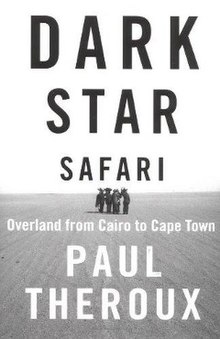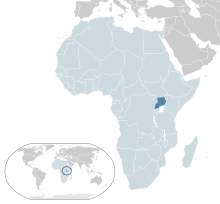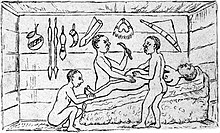 First edition | |
| Author | Paul Theroux |
|---|---|
| Country | United States |
| Language | English |
| Genre | Non-fiction |
| Publisher | Houghton Mifflin |
Publication date | 2002 |
| Media type | Print (Hardback & Paperback) |
Republic of Uganda[1] | |
|---|---|
| Motto: "For God and My Country" "Kwa Mungu na nchi yangu" | |
| Anthem: "Oh Uganda, Land of Beauty" | |
 | |
| Capital and largest city | Kampala |
| Official languages | |
| Religion (2014 census)[6] |
|
| Demonym(s) | Ugandan |
| Government | Unitary dominant-party presidential republic |
| Yoweri Museveni | |
| Jessica Alupo | |
| Robinah Nabbanja | |
| Legislature | Parliament |
| Independence from the United Kingdom | |
• Dominion | 9 October 1962 |
• Republic | 9 October 1963 |
• Current constitution | 8 October 1995 |
| Area | |
• Total | 241,038 km2 (93,065 sq mi) (79th) |
• Water (%) | 15.39 |
| Population | |
• 2023 estimate | 47,729,952[7] (31st) |
• Density | 157.1/km2 (406.9/sq mi) (75th) |
| GDP (PPP) | 2023 estimate |
• Total | |
• Per capita | |
| GDP (nominal) | 2023 estimate |
• Total | |
• Per capita | |
| Gini (2016) | medium |
| HDI (2022) | medium (159th) |
| Currency | Ugandan shilling (UGX) |
| Time zone | UTC+3 (EAT) |
| Driving side | left |
| Calling code | +256a |
| ISO 3166 code | UG |
| Internet TLD | .ug |
Uganda,[b] officially the Republic of Uganda,[c] is a landlocked country in East Africa. The country is bordered to the east by Kenya, to the north by South Sudan, to the west by the Democratic Republic of the Congo, to the south-west by Rwanda, and to the south by Tanzania. The southern part of the country includes a substantial portion of Lake Victoria, shared with Kenya and Tanzania. Uganda is in the African Great Lakes region, lies within the Nile basin, and has a varied but generally modified equatorial climate. As of 2023, it has a population of around 49.6 million, of which 8.5 million live in the capital and largest city of Kampala.
Uganda is named after the Buganda kingdom, which encompasses a large portion of the south of the country, including the capital Kampala, and whose language Luganda is widely spoken throughout the country. From 1894, the area was ruled as a protectorate by the United Kingdom, which established administrative law across the territory. Uganda gained independence from the UK on 9 October 1962. The period since then has been marked by violent conflicts, including an eight-year-long military dictatorship led by Idi Amin.

The official language is English, although the Constitution states that "any other language may be used as a medium of instruction in schools or other educational institutions or for legislative, administrative, or judicial purposes as may be prescribed by law." Luganda, a central region-based language, is widely spoken across the Central and South Eastern regions of the country, and several other languages are also spoken including Ateso, Lango, Acholi, Runyoro, Runyankole, Rukiga, Luo, Rutooro, Samia, Jopadhola, and Lusoga. In 2005 Swahili, which is foreign and so viewed as being neutral, was proposed as Uganda's second official language, but this has yet to be ratified by parliament. However, in 2022 Uganda decided to make Swahili a mandatory subject in the school curriculum.
Uganda's current president is Yoweri Kaguta Museveni, who took power in January 1986 after a protracted six-year guerrilla war. Following constitutional amendments that removed term limits for the president, he was able to stand and was elected president in the 2011, 2016 and 2021 general elections.
History
Precolonial Uganda

Much of Uganda was inhabited by Central sudanic- and Kuliak-speaking farmers and herders until 3,000 years ago, when Bantu speakers arrived in the south and Nilotic speakers arrived in the northeast. By 1500 AD, they had all been assimilated into Bantu speaking cultures south of Mount Elgon, the Nile River, and Lake Kyoga.[13]
According to oral tradition and archeological studies, the Empire of Kitara covered an important part of the Great Lakes Area, from the northern lakes Albert and Kyoga to the southern lakes Victoria and Tanganyika.[14] Kitara is claimed as the antecedent of the Tooro, Ankole, and Busoga kingdoms.[15]
Some Luo invaded Kitara and assimilated with the Bantu society there, establishing the Biito dynasty of the current Omukama (ruler) of Bunyoro-Kitara.[16]
Arab traders moved into the land from the Indian Ocean coast of East Africa in the 1830s for trade and commerce.[17] In the late 1860s, Bunyoro in Mid-Western Uganda found itself threatened from the north by Egyptian-sponsored agents.[18] Unlike the Arab traders from the East African coast who sought trade, these agents were promoting foreign conquest. In 1869, Khedive Ismail Pasha of Egypt, seeking to annex the territories north of the borders of Lake Victoria and east of Lake Albert and "south of Gondokoro,"[19] sent a British explorer, Samuel Baker, on a military expedition to the frontiers of Northern Uganda, with the objective of suppressing the slave-trade there and opening the way to commerce and "civilization." The Banyoro resisted Baker, who had to fight a desperate battle to secure his retreat. Baker regarded the resistance as an act of treachery, and he denounced the Banyoro in a book (Ismailia – A Narrative Of The Expedition To Central Africa For The Suppression Of Slave Trade, Organised By Ismail, Khadive Of Egypt (1874))[19] that was widely read in Britain. Later, the British arrived in Uganda with a predisposition against the kingdom of Bunyoro and sided with the kingdom of Buganda. This would eventually cost Bunyoro half of its territory, which was given to Buganda as a reward from the British. Two of the numerous "lost counties" were restored to Bunyoro after independence.
In the 1860s, while Arabs sought influence from the north, British explorers searching for the source of the Nile[20] arrived in Uganda. They were followed by British Anglican missionaries who arrived in the kingdom of Buganda in 1877 and French Catholic missionaries in 1879. This situation gave rise to the death of the Uganda Martyrs in 1885—after the conversion of Muteesa I and much of his court, and the succession of his anti-Christian son Mwanga.[21]
The British government chartered the Imperial British East Africa Company (IBEAC) to negotiate trade agreements in the region beginning in 1888.[22]
From 1886, there was a series of religious wars in Buganda, initially between Muslims and Christians and then, from 1890, between "ba-Ingleza" Protestants and "ba-Fransa" Catholics, factions named after the imperial powers with which they were aligned.[23][24] Because of civil unrest and financial burdens, IBEAC claimed that it was unable to "maintain their occupation" in the region.[25] British commercial interests were ardent to protect the trade route of the Nile, which prompted the British government to annex Buganda and adjoining territories to create the Uganda Protectorate in 1894.[22]: 3–4 [26]
Uganda Protectorate (1894–1962)



沒有留言:
張貼留言